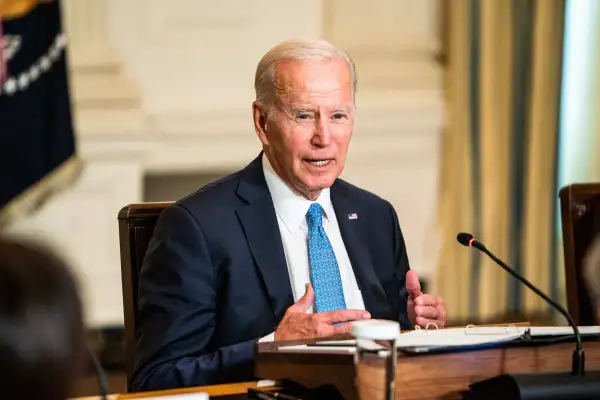Biden’s Student Loan Forgiveness Plan Faces Its First Legal Challenge

The Biden administration’s student loan forgiveness plan is officially facing its first legal challenge. A new lawsuit alleges the program is unfair because some Americans will be forced to pay state taxes on their forgiven debt.
The Pacific Legal Foundation, a libertarian legal foundation, filed the complaint Tuesday in Indiana. It aims to block President Joe Biden's recently announced student loan relief initiative, which would cancel up to $10,000 in federal student loan debt for borrowers who earn less than $125,000 and up to $20,000 for qualified borrowers who received a need-based Pell Grant in college.
The lawsuit comes after the Congressional Budget Office released an analysis earlier in the week estimating the plan will cost the federal government $400 billion to implement.
The high price tag and litigation give ammunition to conservative critics who say forgiving student loan debt will hurt taxpayers while helping a group of beneficiaries they consider to be the educated elite.
The plaintiff, Frank Garrison, is an attorney who has been working toward getting his student debt forgiven through Public Service Loan Forgiveness (PSLF), an existing federal program that offers a path to relief for certain full-time employees of federal, state, local, tribal and not-for-profit organizations. Garrison is just over four years away from qualifying for full forgiveness, according to the lawsuit.
The Pacific Legal Foundation argues that Garrison will be harmed by Biden's overall forgiveness plan because he could have to pay a state tax on his loan forgiveness. He lives in Indiana, which is among a small minority of states that intends to tax forgiven student loans as income. (Others include Arkansas, Minnesota, Mississippi, North Carolina and Wisconsin.)
The foundation motioned for an injunction and a temporary restraining order as it seeks a halt to the cancellation of student debt before Oct. 1 — around the time when the application process for loan relief is set to go live.
The White House indicated it doesn’t view the lawsuit as a major hurdle to the plan, characterizing the lawsuit as “baseless.”
“No one will be forced to get debt relief. Anyone who does not want debt relief can choose to opt out,” White House spokesperson Abdullah Hasan tweeted. “Opponents of the debt relief plan are trying anything they can to stop this program that will provide needed relief to working families.”
Legal experts told the Washington Post that if Garrison chooses not to apply for (and accept) student loan forgiveness under the new program, he wouldn't be subject to additional state taxes. But it will be up to a federal judge in Indiana if the case has enough merit to delay the mass forgiveness of student debt for millions of Americans.
This isn't the only legal hurdle Biden's student loan forgiveness plan is likely to face.
Conservative groups dispute that Biden has the authority to cancel student debt without congressional approval. The Biden administration argues it can cancel federal student loan debt under an act that gives the president powers to alleviate hardship for borrowers in the event of national emergencies — in this case, the COVID-19 pandemic.
Some legal experts have said the case could ultimately end up in the Supreme Court, where there's a 6-3 conservative majority, further endangering the timeline for forgiveness.
More from Money:
How to Apply for Biden’s Student Loan Forgiveness Program
Everything You Need to Know About Biden's Student Loan Forgiveness Plan
Student Loan Payments Resume in January, but Most Borrowers Say They Can't Afford to Pay
